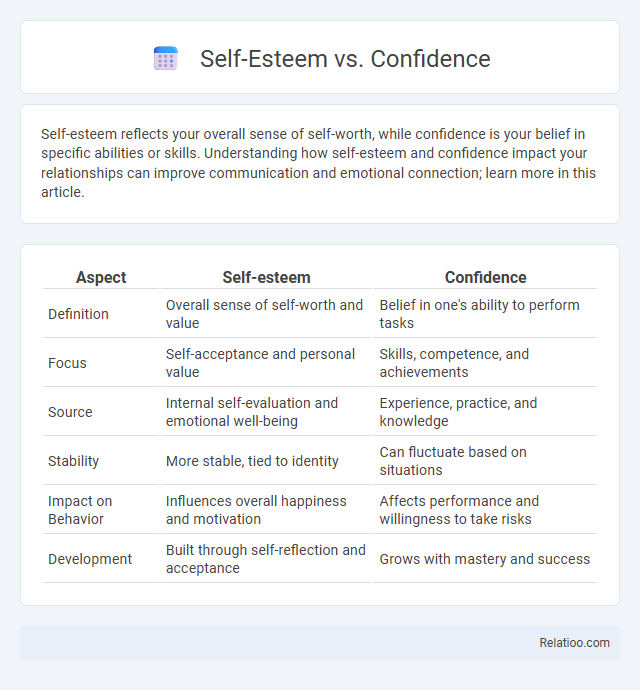Self-esteem reflects your overall sense of self-worth, while confidence is your belief in specific abilities or skills. Understanding how self-esteem and confidence impact your relationships can improve communication and emotional connection; learn more in this article.
Table of Comparison
| Aspect | Self-esteem | Confidence |
|---|---|---|
| Definition | Overall sense of self-worth and value | Belief in one's ability to perform tasks |
| Focus | Self-acceptance and personal value | Skills, competence, and achievements |
| Source | Internal self-evaluation and emotional well-being | Experience, practice, and knowledge |
| Stability | More stable, tied to identity | Can fluctuate based on situations |
| Impact on Behavior | Influences overall happiness and motivation | Affects performance and willingness to take risks |
| Development | Built through self-reflection and acceptance | Grows with mastery and success |
Defining Self-Esteem and Confidence
Self-esteem refers to an individual's overall sense of self-worth and value, deeply rooted in personal beliefs and emotional experiences. Confidence is the belief in one's abilities to perform specific tasks or face challenges effectively, often built through skills and achievements. While self-esteem reflects internal acceptance, confidence manifests in external actions and behaviors.
Key Differences Between Self-Esteem and Confidence
Self-esteem refers to the overall sense of self-worth and value, while confidence is the belief in one's abilities to perform specific tasks successfully. Self-esteem is more stable and rooted in self-acceptance, whereas confidence fluctuates based on experiences and achievements. Understanding this distinction helps individuals focus on developing a healthy self-view alongside practical skills for various challenges.
The Origins of Self-Esteem
The origins of self-esteem stem from early childhood experiences, where consistent validation and emotional support from caregivers foster a positive self-view. Research shows that secure attachments and affirmations during formative years significantly influence one's intrinsic sense of worth, distinguishing self-esteem from confidence, which often arises from skill mastery and external achievements. Self-discovery involves an ongoing process of introspection that deepens understanding of personal values and strengths, further reinforcing authentic self-esteem beyond transient successes.
How Confidence is Developed
Confidence is developed through consistent practice, positive self-reinforcement, and overcoming challenges that build resilience and competence. Engaging in new experiences and setting achievable goals promotes a sense of accomplishment, which strengthens self-assurance. Feedback from social interactions and personal reflection also play essential roles in shaping and enhancing one's confidence levels.
The Interconnection Between Self-Esteem and Confidence
Self-esteem and confidence are deeply interconnected, as your self-esteem forms the foundation for genuine confidence by shaping your overall self-worth and belief in your abilities. High self-esteem boosts your confidence, enabling you to take risks and face challenges with resilience, while low self-esteem often undermines self-assurance and hinders personal growth. Understanding this dynamic helps you navigate self-discovery by recognizing the importance of nurturing both to build a balanced and authentic sense of self.
Signs of Healthy Self-Esteem vs High Confidence
Healthy self-esteem is characterized by a balanced sense of self-worth, where you accept your strengths and weaknesses without harsh judgment, leading to resilience in the face of criticism. High confidence often manifests as assertiveness and a strong belief in your abilities, but it may lack the deep self-acceptance found in true self-esteem. Understanding these differences is crucial for your journey of self-discovery, helping you cultivate both inner value and external assurance.
Impact on Relationships and Social Interactions
Self-esteem shapes how you value yourself and directly influences your ability to establish trust and intimacy in relationships, while confidence affects your social presence and the ease with which you communicate and assert your ideas. Self-discovery deepens your understanding of personal needs and boundaries, leading to more authentic interactions and stronger emotional connections. Together, these elements enhance your relational skills by fostering respect, empathy, and effective communication in social settings.
Common Myths About Self-Esteem and Confidence
Common myths about self-esteem and confidence often confuse these distinct concepts, leading to misunderstandings. Self-esteem is your overall sense of self-worth, while confidence pertains to trust in your abilities or skills in specific areas. Understanding that self-discovery is a vital process for developing authentic self-esteem and confidence helps you avoid false beliefs that these traits come instantly or from external validation.
Boosting Self-Esteem and Building Confidence
Boosting self-esteem involves recognizing your inherent worth and embracing positive self-talk to counteract negative beliefs, which lays the foundation for genuine confidence. Building confidence requires consistent practice, setting achievable goals, and celebrating small victories to strengthen your belief in your abilities. Engaging in self-discovery helps you understand your values and passions, providing clarity that supports both enhanced self-esteem and lasting confidence.
Self-Esteem vs Confidence in Personal Growth
Self-esteem reflects an individual's overall sense of self-worth, while confidence pertains to belief in one's abilities in specific areas; personal growth requires nurturing both to build a balanced and resilient identity. Research indicates higher self-esteem contributes to greater emotional stability, whereas confidence boosts motivation and performance in goal-oriented tasks. Developing self-esteem fosters inner acceptance, serving as the foundation for authentic self-discovery and sustainable confidence.

Infographic: Self-esteem vs Confidence
 relatioo.com
relatioo.com